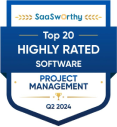Project management is such a broad discipline that project managers often feel confused about their roles and responsibilities. Yet perhaps an even greater challenge lies in the fact that there is no standard definition of what a project manager should do, nor is there a fixed scope. Responsibilities can vary widely depending on factors such as the size, industry, and complexity of the project, organizational structure, and a person’s experience. That’s why it is important for almost every project manager to know their main roles and responsibilities.
No matter what background or organizational structure they are coming from, there are certain roles and responsibilities with which success comes. In this chapter, we are going to uncover the most common roles and responsibilities of a project manager.
Key responsibilities for project managers
A project manager has to perform certain duties from the conception of the project to the completion. Their role is critical in keeping a project on track, within budget, and aligned with the desired results.
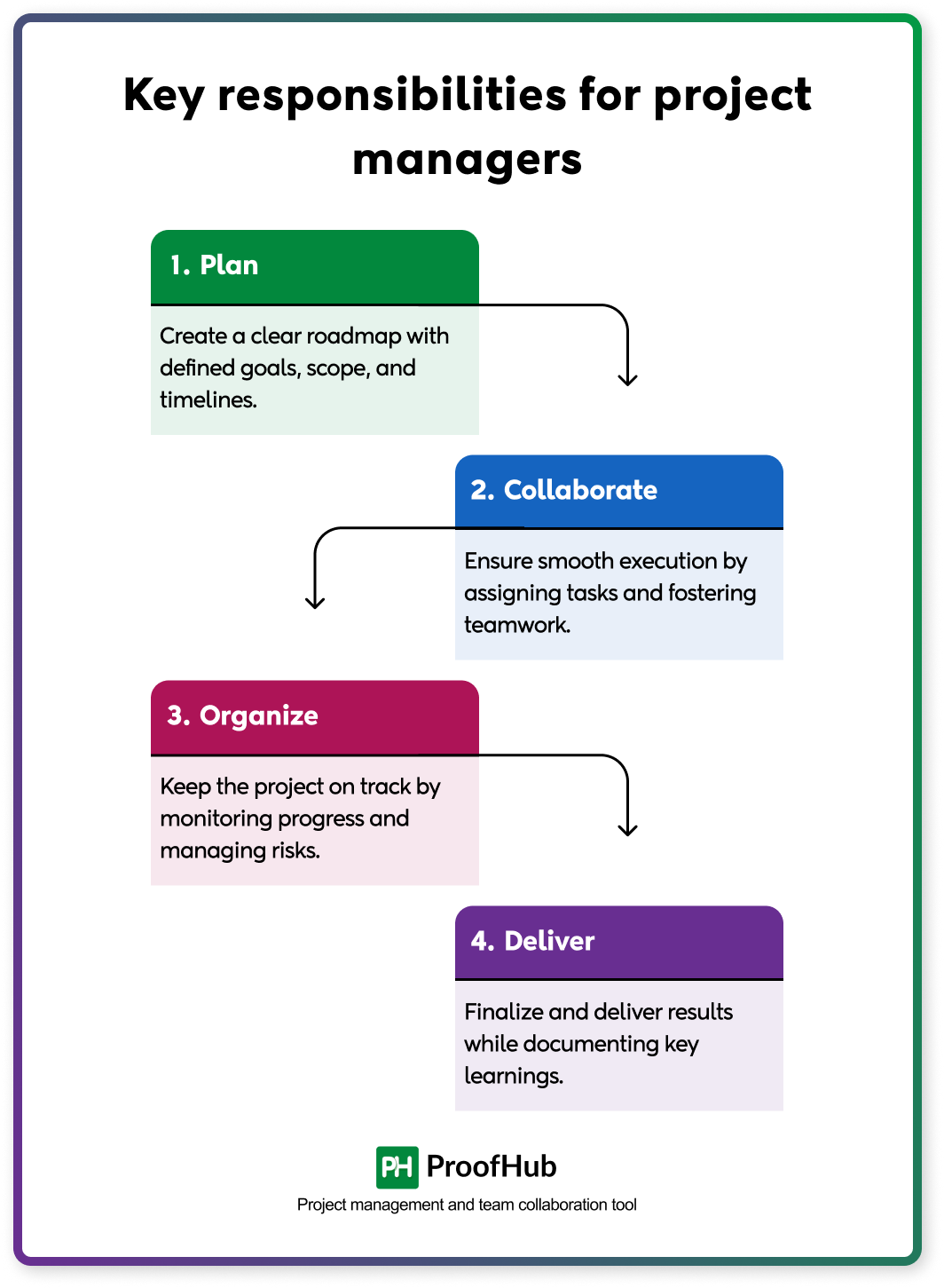
To make it easy to understand, we have explained the various responsibilities or duties of a project manager at each stage of the project.
1. Plan (Initiate and planning)
The first and the most critical stage of a project. A well-thought-out plan not only saves time but also prevents confusion while increasing the chances of success. During this stage, a manager defines the scope, objectives, milestones, tasks, and timelines of a project including:
- Understand the project: A project manager starts reviewing key documents such as:
- Project charter: Document that provides project’s official approval state.
- Business case: Details the reasons why the project is actually needed.
- Feasibility study: An analysis of whether the project can be done.
- Stakeholder analysis: List of people affected by the project and their needs.
If anything seems unclear, the project manager meets with key people, team members, clients, vendors, and senior management, asks questions, and understands expectations.
- Define objectives and project scope: At this point, project managers clarify the project goals and ensure alignment with organizational objectives to avoid confusion later. The project manager:
- Write down the main goal of the project.
- Defines what is included in the project (and what is not).
- Breaks the project into smaller parts with key deadlines.
- Make a project plan: Create detailed plans for how everything will get done. It includes:
- Tasks and deadlines: A compiled list of tasks that need to be done and when.
- Resources needed: Budget, tools, and resources required.
- Risks and solutions: Identify potential risks, assess their impact, and develop ways to handle them.
2. Collaborate (Execute)
Once the plan is ready, the project manager ensures smooth execution by assigning tasks, setting deadlines, and monitoring progress. Their role is to keep things moving efficiently and resolve obstacles to keep productivity going.
Here’s what a project manager does at this stage:
- Assign tasks: Ensure that everyone knows what they are supposed to do.
- Track progress: Check if work is getting done on time and up to standard.
- Solve problems: Handle delays, technical issues or conflicts.
- Encourage teamwork: Keep communication smooth between team members and different departments.
- Update stakeholders: Keep stakeholders, including clients, managers, and other key personnel, informed about the progress so far, challenges, if any.
- Keep records: Document reports, meeting notes, and approvals so that everyone is in sync and organized.
3. Organize (Monitor and control)
Even the best plan can face unexpected challenges; therefore, this stage is of utmost importance. There is a likelihood that some of the tasks may take longer, costs might increase, or new risks may arise. The role of a project manager here is to keep:
- Track progress: Measure performance using ProofHub’s tools like Gantt charts and Kanban boards to monitor tasks.
- Ensure quality: Conduct quality checks and ensure deliverables meet agreed-upon standards.
- Risk management: Proactively identify and address all possible risks before they grow further.
- Handle changes: Evaluate and implement change requests while minimizing disruption.
- Adjust plans: If something unexpected happens, revise the plan and update the team.
- Motivate the team: Keep the team motivated and productive by creating a positive work environment.
- Conflict resolution: Handle disputes within the team and maintain harmony.
- Update stakeholders: Keep stakeholders, including clients, managers, and other key personnel, informed about the progress so far, challenges, if any.
4. Deliver (Closure)
This is the final stage, where the project is handed over. A project isn’t truly complete until everything is delivered, reviewed, and documented carefully. It is advised not to rush through this phase. At this stage, a project manager performs the following duties:
- Deliver final results: Make sure all tasks are completed and stakeholders approve the final deliverables.
- Documentation: Create final reports, record lessons learned, and share insights for future projects.
- Handover to operations: Transfer project knowledge and skills to teams responsible for ongoing project work.
- Evaluate performance: Review what went well and what could be improved for future projects.
- Celebrate success: Acknowledge the team’s efforts to maintain morale.
Skills every project manager should have
Project management is a balancing act. As a project manager, it is crucial to balance people with processes while seeking immediate progress and long-term improvement. Remember, developing skills takes practice, patience, and perseverance. To handle these responsibilities effectively, project managers need a mix of technical expertise and soft skills. Here are a few essential ones:
Technical skills
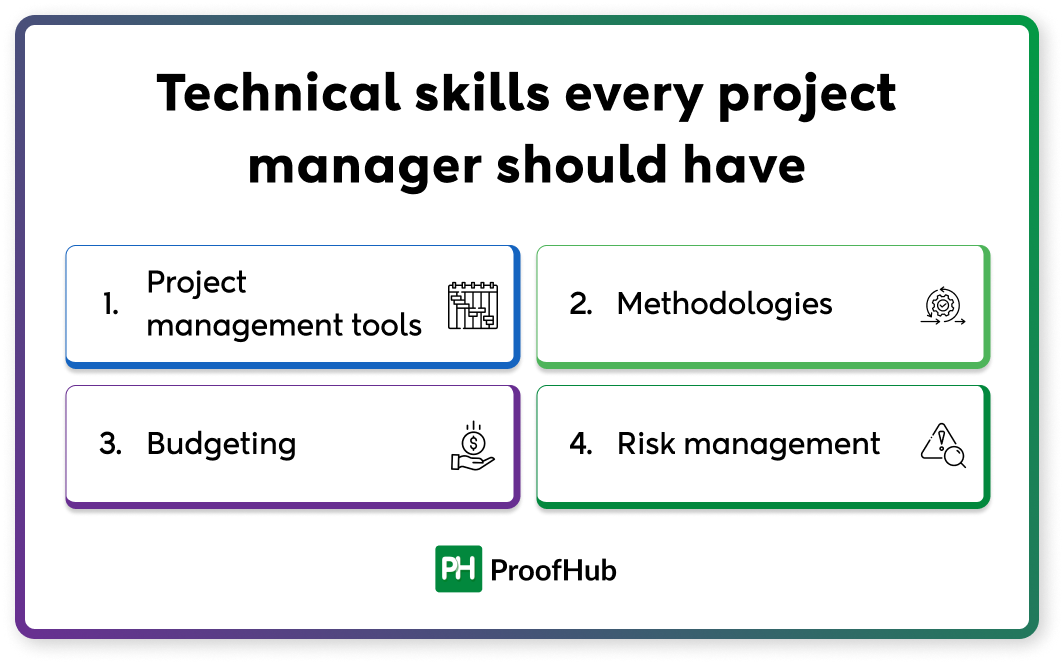
Project managers need to plan, execute, and monitor projects effectively. To do so, having the following key technical skills is essential:
- Project management tools: Project management tools streamline workflows, enhance collaboration, and provide real-time insights into progress. Many planning systems and tools, such as Microsoft Project, Trello, Jira, and Asana, are available to make management easy. However, for an all-in-one project management software, definitely try ProofHub, which provides a central platform for managing all project needs.
- Methodologies: Different projects require different approaches, and mastering various methodologies allows you to choose the most effective framework for your project. An in-depth understanding of Agile, Scrum, Kanban, Waterfall, and Hybrid project management methodologies provides a better way of managing projects.
- Budgeting: Understand financial planning and cost estimation. To do so effectively, a project manager should be well-versed to strategically divide the project budget across the project’s life cycle.
- Risk management: Learn to identify, analyze, and mitigate risks. A project manager keeps detailed records of identified risks, decisions made, mitigation strategies, and documents describing what worked and what didn’t for reference in future projects.
Soft skills
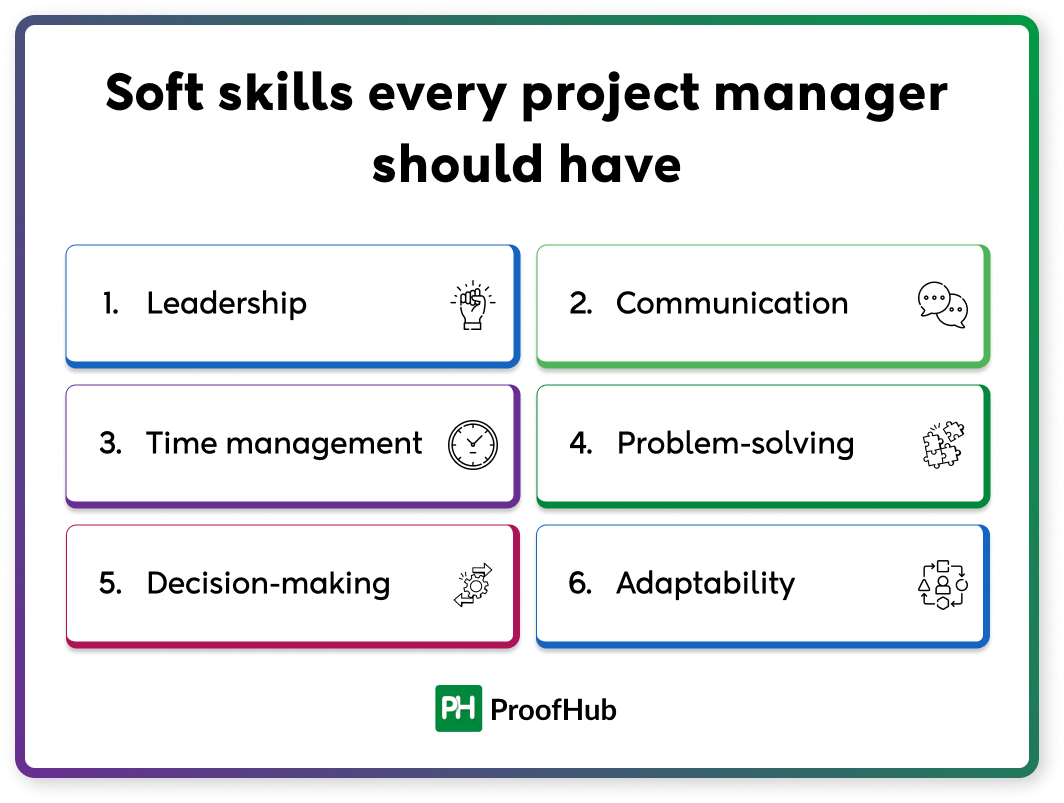
When it comes to managing teams, building relationships, and adapting to challenges, soft skills are critical such as:
- Leadership: Inspiring and motivating the team to work toward the project’s goals helps maintain a positive, conducive, and productive environment in which team members freely express their ideas and concerns without fear of judgment.
- Communication: Clearly conveying ideas, instructions, and updates to team members and stakeholders, both verbally and in writing, helps them work within the project expectations and timeline.
- Time management: Prioritizing tasks, managing deadlines, and ensuring the team stays on schedule. Regular check-ins and progress reviews are one of the ways to ensure that the team stays aligned with the timeline.
- Problem-solving: Begin by identifying the problem, analyzing potential solutions, and implementing them. It is important to quickly identify and address issues that arise, from interpersonal conflicts to unexpected delays.
- Decision-making: Projects often require swift decisions, such as selecting vendors, allocating resources, or adjusting timelines. Analyzing information, evaluating options, and making informed decisions under pressure are critical skills for project managers.
- Adaptability: Flexibility and the ability to adjust strategies are crucial because projects rarely go as planned. Embracing change, revisiting the plan, or even supporting the team all go a long way in offering guidance to help the team transition smoothly.
A day in the life of a project manager
A project manager’s day is often a juggling act of prioritization, communication, and problem-solving. Here’s a breakdown of what a typical day might look like for a project manager:
1. Morning check-in: Getting a status update
A typical morning begins with checking in to go over ongoing tasks on project management and team collaboration tools like ProofHub. Having a clear view of the current status ensures alignment and saves from last-minute surprises.
2. Midday: Crafting a To-Do list
Listing down tasks or preparing to-do lists helps project managers manage personal tasks such as preparing for meetings, reviewing documents, and resolving conflicts, if any. By breaking the day into actionable items, project managers can stay organized and reduce overwhelm. Task prioritization is done based on urgency and impact. A large part of how the day is progressing is checked by reviewing the list mid-day and making adjustments as needed.
3. Afternoon: Time blocking for deep work
Generally, during the afternoons, project managers need uninterrupted time to focus on critical tasks such as conflict resolution, budgeting, and timeline reviews. Studies confirm that, on average, distractions can lead to a productivity loss of two hours daily.
4. Team check-ins and communication
Regular check-ins with team members provide updates, clarify deliverables, and address any roadblocks. Morning standups, weekly huddles, or progress meetings ensure that everyone in the team is aligned and motivated.
5. End of the day: Planning ahead
A project manager’s job extends beyond daily tasks. Keeping a bird’s eye view of upcoming milestones and dependencies is essential. Allocate time each week to:
- Review timelines and adjust plans
- Identify risks and potential delays
- Plan for future phases and resource needs
Balancing leadership and management
Both management and leadership competence are needed for sustainable success in a management position. In the long run, a manager showing only strengths in one of the two competence areas will find it challenging to maintain high-performing teams. Only good managerial skills combined with good leadership can lead to sustainable and high success.
Balancing leadership and management is not about dividing your time equally but about adapting your approach to meet the project’s and team’s needs. Here’s how:
- Recognize the situation: During the planning phase, strong management is critical. During the execution phase, leadership becomes more important to keep the team motivated and aligned.
- Lead by example: Be a role model in both leadership and management. For instance, demonstrate commitment to quality (management) while maintaining open communication (leadership).
- Empower your team: Strike a balance by delegating tasks (a management skill) while encouraging autonomy and creativity (a leadership skill).
- Communicate effectively: Use clear and consistent communication to manage expectations and inspire confidence. Tailor your message depending on whether you address technical details or rally the team.
- Reflect and adapt: Continuously assess whether your team needs more guidance (management) or motivation (leadership) and adjust accordingly.
Why this balance matters
- Without leadership, the project risks becoming rigid and uninspiring. The team may meet deadlines, but morale and innovation might suffer.
- Without management, the project may lack structure and control, leading to missed deadlines, cost overruns, and chaos.
By mastering both, a project manager ensures that the project is completed successfully and that the team grows and thrives along the way.
How to become a better project manager with ProofHub
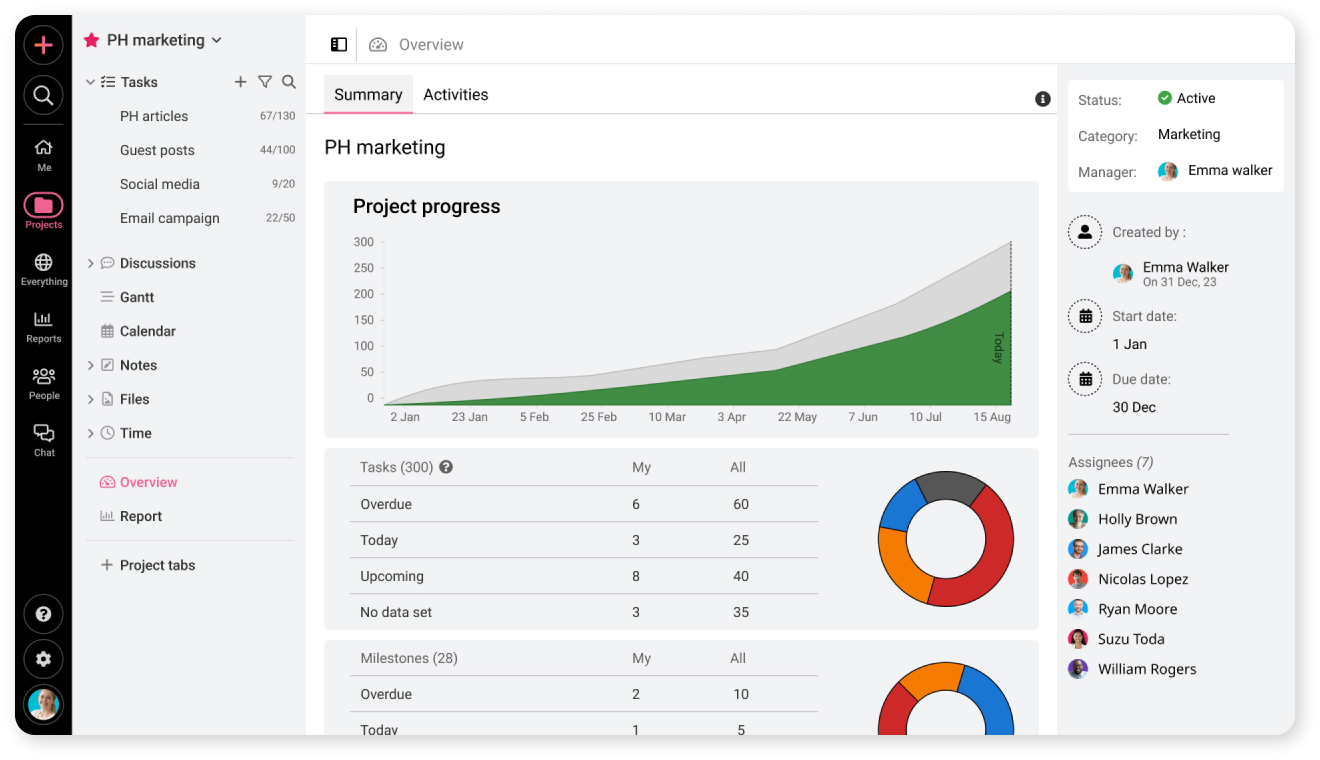
Regardless of an organization’s tools, processes, culture, etc., the project manager must be skilled in delivering results. Some organizations believe that they just need to set up the right systems to manage projects. With the right software and processes, they argue, project management will succeed. However, this view overlooks the critical role of a talented, skilled, and well-trained project manager in delivering results.
Project management tools like ProofHub can help managers become better at handling projects by offering a centralized platform. A platform that supports project planning, task management, time tracking, team collaboration, and file management, all in one place.
Here’s a breakdown of how ProofHub can help project managers with their various responsibilities:
- Define objectives and project scope: ProofHub helps project managers define objectives and project scope by allowing them to create a central location to store all important information about the project, such as project charter, business case, feasibility study, and stakeholder analysis.
- Make a project plan: ProofHub allows project managers to create detailed project plans that include tasks and deadlines, resources needed, risks, and solutions. Project managers can use ProofHub’s Gantt charts and Kanban boards to visualize project deadlines, set dependencies, and pinpoint roadblocks.
- Assign tasks: ProofHub centralized task management allows project managers to assign tasks to team members, track progress, and set deadlines.
- Track progress: ProofHub’s Kanban board helps project managers track progress, identify bottlenecks, and stay ahead of deadlines. ProofHub reports can be used to review project performance and identify areas for improvement.
- Encourage teamwork: ProofHub provides features like discussion topics, chat, and file sharing, which help project managers encourage teamwork and keep communication smooth between team members and different departments.


